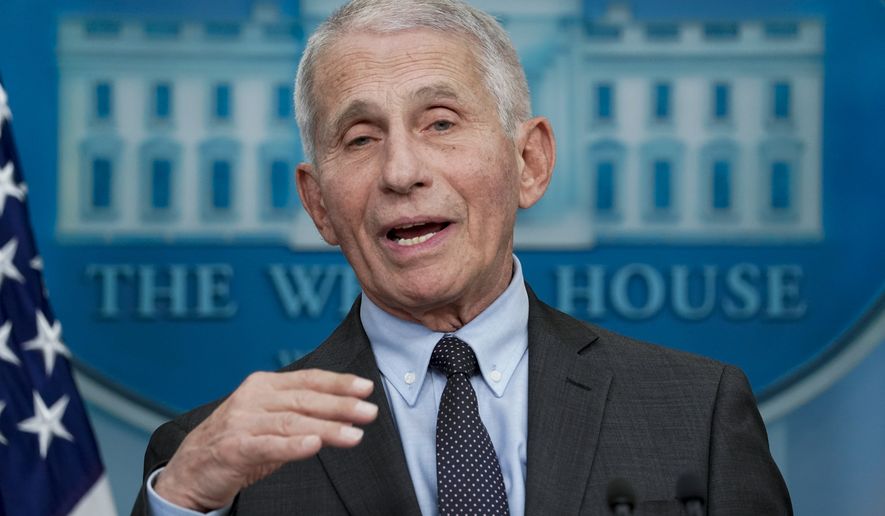Dr. Anthony Fauci defended his legacy and made a final plea for Americans to get an updated COVID-19 booster in a White House sendoff Tuesday after nearly 40 years as the top infectious diseases researcher at the National Institutes of Health.
Dr. Fauci, 81, stood by his performance on COVID-19, saying his team had to deal with an evolving situation that wasn’t “static” and that opponents spread bogus information online.
“You always underscore the dynamic nature of what you’re dealing with,” said Dr. Fauci, who is retiring next month. “The other side, that just keeps putting out misinformation and disinformation, seems to be tireless in that effort.”
Dr. Fauci also said he will have no problem testifying in Congress about his performance if House Republicans drag him out of retirement.
“If there are oversight hearings, I absolutely will cooperate fully and testify before the Congress, if asked,” he said. “We can defend and explain and stand by everything that we’ve said. So I have nothing to hide.”
The White House tried to focus on the business of the day — promoting the updated, or bivalent, shots that induce a better immune response against circulating variants than shots designed to attack the original strain alone.
SEE ALSO: Gallup poll: 1 in 4 workers still fears catching COVID at work
“If in fact, if you are vaccinated and boosted, compared to an unvaccinated person there is a 14 times lower risk of dying in the most recent BA.4/5 era compared to the unvaccinated,” Dr. Fauci said, referring to the most recent variants in his final trip to the White House podium.
The briefing erupted into chaos at times, with reporters interrupting each other to get in a final question about the virus’ origins in China and other matters.
Between 10% and 15% of the U.S. population has gotten the new booster, underscoring White House efforts to improve uptake.
The White House said it will dole out $350 million for community health centers to expand local vaccine efforts, including mobile and walk-in clinics, and spend $125 million to make sure at-risk persons get vaccinated at senior and community centers.
White House COVID-19 Coordinator Ashish Jha said he expects college campuses to hold vaccine clinics in the sprint to the holidays and that World Cup viewers should expect ads promoting the vaccines.
He also called on Congress to offer more funding for the next generation of vaccines, saying places like China will race ahead in the push for nasal sprays and other tools.
President Biden and his team are hoping to avoid the wave of disease and death that impacted the holiday seasons in 2020 and 2021. They’re also skittish about the confluence of COVID-19 with the early onset of influenza and a respiratory syncytial virus, or RSV.
The White House messaging on the campaign focused on avoiding disease and hospitalization rather than stemming coronavirus transmission, as it has become clear that vaccinated persons can still get infected or spread the pathogen.
Dr. Fauci acknowledged that some people are fed up with recurring shots, but said immunity wanes over time with the coronavirus vaccines. He also signaled he is weary of people claiming the shots are unsafe.
“It should be off the table,” Dr. Fauci said, pointing to the hundreds of millions of vaccines distributed worldwide.
He said he is hopeful that alarming variants slamming places like Singapore won’t deliver a heavy dose of disease in the U.S., given a built-up wall of immunity in this country.
Dr. Fauci has led the National Institute of Allergy and Infectious Diseases since 1984 during the Reagan administration. He announced his departure in August but said he plans to work to inspire the next generation of medical leaders.
Republicans, who recently took the House majority, say they have other plans for him. They plan to call him to Capitol Hill to testify on COVID-19 policies and the origins of the coronavirus in Wuhan, China, and whether NIH grants played some kind of role.
A trusted voice for many in the scientific community, Dr. Fauci drew ire from conservative leaders for advising stay-at-home policies and other precautions during the COVID-19 crisis.
Former President Donald Trump enlisted him for his COVID-19 task force but quickly turned on him, accusing the doctor of flip-flopping on key advice, including whether masks would be necessary to box out the virus in early 2020.
Other critics said he oversold the power of COVID-19 vaccines to combat infection versus severe disease and wasn’t strict enough in overseeing U.S. funding for a grantee at a virology institute in Wuhan.
Dr. Fauci downplayed the need for things like mask mandates, given tools that are available, on Tuesday and said family members should evaluate the risks of individual members to determine whether masks or pre-gathering testing is needed.
Dr. Fauci rose to prominence during the HIV/AIDS crisis in the 1980s. After early criticism, he won over key leaders in the AIDS community by advocating for research on treatment.
He was a key part of the U.S. response to the Ebola and Zika crises before the coronavirus made him an instantly recognizable face who adorned best-selling bobbleheads. He even threw out a first pitch for the Washington Nationals.
Dr. Jha lavished praise on the doctor, deeming him the “most consequential” public servant of the last half-century.
Dr. Fauci said the COVID-19 era is a “fragment” of his career and he will “let other people judge the value or not of my accomplishments.”
“It’s really a great pleasure to be back here with you again,” Dr. Fauci told reporters. “Albeit, I believe, for the last time.”
For more information, visit The Washington Times COVID-19 resource page.
• Tom Howell Jr. can be reached at thowell@washingtontimes.com.




Please read our comment policy before commenting.